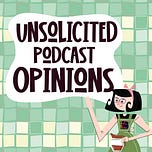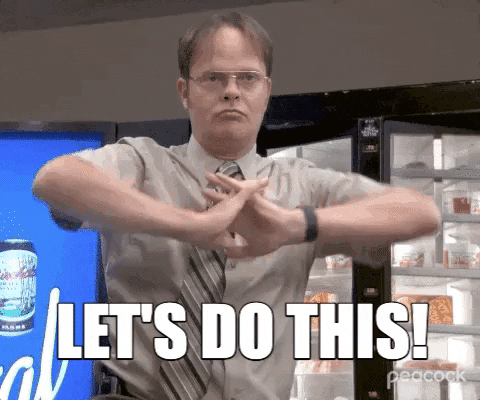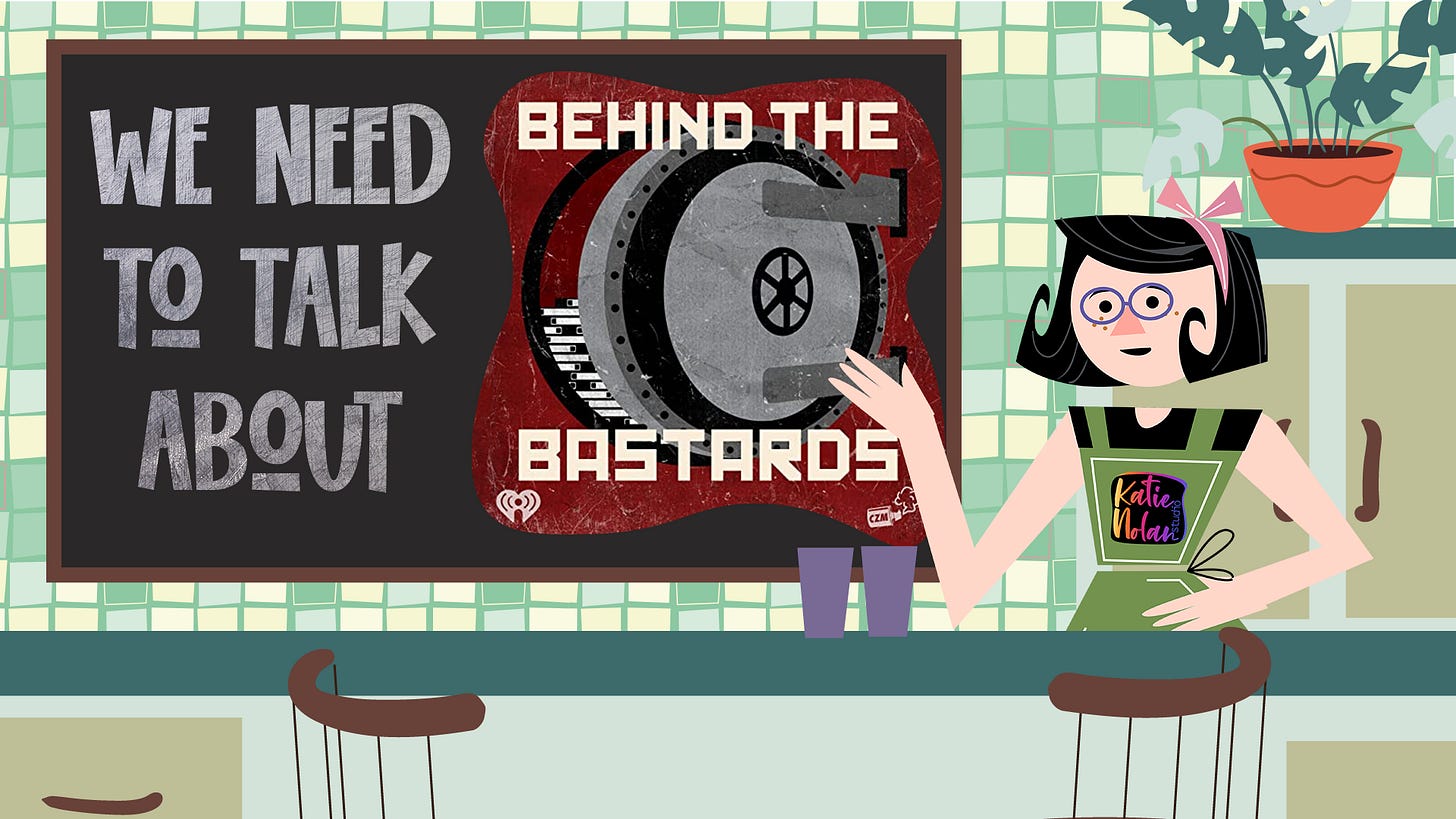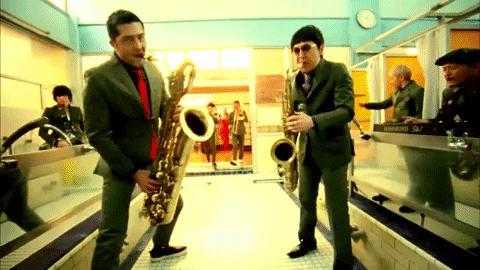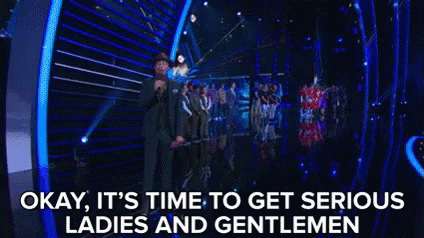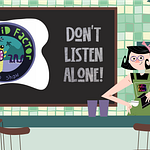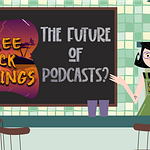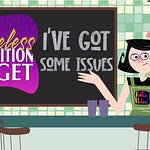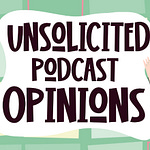Sounds ominous, doesn’t it? It feels appropriate, though. My episode on Double Love was easy, all things considered, because it was basically a non-stop lovefest. This episode gets more critical, which is nerve-wracking for someone like me, who just wants everyone to like them.
But what’s the point of being an opinionated know-it-all if I don’t share my opinions, right? 😂 So…
Annotated Transcript
Guten tag, my friends!
I’m Katie Nolan, and this is Unsolicited Podcast Opinions, the show where you get more than my 2 cents… you get the whole damn dollar.
I love podcasts – and according to my housemates, I talk about them way too much. So I decided to make my own podcast, where I can share all the opinions nobody asked for and my weird ADHD tangents, and NOBODY CAN STOP ME.
Today I’m breaking down Cool Zone Media’s Behind the Bastards,
a podcast that tells the wild and often little known stories about the worst humans in all of history – I’m talking everything from Hitler’s drug problem (multiple drug problems) to Saddam Hussein’s erotic novels to the racist cult origins of the Celestial Seasonings tea brand. (Don’t worry; they aren’t owned by a racist cult anymore. You can still drink the tea. )
Behind the Bastards is another podcast where I’ve listened to pretty much the entire catalog multiple times over as a pandemic coping mechanism. Which is kind of weird, considering it sounds like a History Channel series hosted by a shock jock.
Robert: Oh yeah, oooh god DAMN, it’s Behind the Bastards, the only podcast on the internet. If you have ever listened to another podcast, no you have not, that’s schizophrenia.
Not exactly soothing, and the topics get very, very dark. But unlike the History Channel, Behind the Bastards doesn’t tell these stories just for edu-tainment. They are podcasting with a purpose.
The show is hosted by Robert Evans and produced by Sophie Lichterman. It’s the flagship program of their network, Cool Zone Media. Forbes calls them a “progressive podcast network,”1 which I think makes them sound like another version of Crooked Media, the network founded by former Obama staffers after the 2016 election.2 I also think this goes to show how little mainstream America understands American leftists.
Where Crooked Media focuses on politics, Cool Zone Media focuses on revolution. Other podcasts in their network include Uprising: A Guide from Portland and The Women’s War, which is literally about a feminist anti-authoritarian revolution in Syria.3
But it all starts with Behind the Bastards.4
Robert Evans had a strange journey to becoming an independent podcaster and investigative reporter.
After dropping out of college, he spent some time working in special education5, and then in 2007 stumbled into a job writing articles for the comedy website Cracked.com. He worked his way up to editorial manager for their personal experience article team6, was forced into video production when the company decided to change their digital strategy, and was laid off on December 5, 2017 when Cracked decided to get rid of its entire video production team.7
Lucky for him, his good friend and former boss Jack O’Brien was, and is, Head of Comedy for the iHeart Podcast Network. Together, they developed and launched Behind the Bastards in 2018.8 It was an enormous success, consistently ranking in the top 10 most downloaded shows on the iHeart Podcast Network.9
The podcast reverses your standard expert interview format.
Instead of inviting experts on to share information, Robert is the expert sharing information with his guests.
That role reversal lets the podcast be a kind of comedic documentary, like Drunk History, but with a sense of humor very much shaped by Cracked.com. Episodes have titles like “How L. Ron Hubbard Made an Antichrist Using Sex Magic,” “Bill Cooper: The Man Who Killed Truth,” and “The Con Artist Who Invented a Country.”
The guests act as an audience stand in while also providing some comic relief.
Prop: My lord, like, there was Mussolini stans!
Robert: Yeah! That’s what’s happening with white people at the time.
Prop: Okay, that’s CRAZY! We’re inventing JAZZ —
Robert: ‘Cause they’re getting real into Mussolini.
Prop: Know what I’m saying? We over here inventing jazz, you talking about Mussolini kinda fly, like, dang man.
Robert: Look at that guy, look at the way he wears boots.
Of course, there’s a reason not many podcasts use this format. While Drunk History tells short, quippy stories, Robert provides deep and comprehensive profiles.
Seriously deep. His four part series on Nicolae Ceausescu spends an hour summarizing Romanian history from Vlad the Impaler through World War II before getting into Ceausescu’s story.
This clearly requires an enormous amount of research and writing. And they’re releasing two episodes a week. And he has other podcasts. And he has published several books.
I hate him. I wish I had even a quarter of his energy and ability to get things done. I release this podcast every other week and all I have to do is share vaguely coherent opinions!
The team has ways to spread out the workload, like recording a number of episodes in advance, but given that they don’t really take any breaks except for around the end of the year, they don’t have a lot of time to build up that buffer, and it gets eaten through very quickly.
So they’ve developed other ways to reduce the pre-production workload. They do episodes where Robert and his friends watch Jordan Peterson’s new show and react to it, or they’ll flip through a weird alt-right book and react to random pages.
On one hand, I think it’s really clever, these sort of breaks from format to ease the load, but I’m not really a huge fan because they’re mostly a chance to take cheap potshots at the alt-right. Now, I am definitely not above taking cheap pot shots, especially at the alt-right, but for me, there’s a difference between talking shit to blow off steam and talking shit for other people’s entertainment. And, I don’t know, when I’m listening to this podcast, I am not here for cheap potshots. I’m here for the expensive, well-researched potshots.
The other challenge with this format is the burden it places on the guest. The guest has to have chemistry with Robert, know when to interject with some comedic relief, when to ask clarifying questions as the audience stand-in, when to share genuine emotional reactions, and when to just shut up and let Robert talk.
It’s not easy to find guests who can do that. Comedian Chris Crofton, who appeared on the two parter about Rudolph Steiner, became fixated on a certain phrase that Robert quoted, and kept interrupting Robert to rant about it. It made the episode basically unlistenable for me, which is why both I can’t remember what the exact phrase was and why I’m not going back to double check.
Another guest kept interrupting Robert with jokes that just weren't really funny; it seemed like she didn’t know what else to do or how else to participate.10
The most successful guests are generally people who worked with Robert at Cracked.com. They already have a great rapport and similar senses of humor, so conversations flow much more naturally.
But this also creates a kind of echo-chamber, and limits what the guest can contribute to the story. You don’t get many moments like this:
Seanbaby: Okay.
Robert: So Michael Obitz really fucking believed in Steven Seagal. Or at least that’s one possibility here. It’s possible that Obitz just saw something in Steven Seagal. It’s also possible that Seagal’s career was bankrolled by the Mafia from day 1 and that Obitz was maybe bribed. I don’t know; I’ve never heard any allegations that Obitz was bribed, maybe he just loved him, but there are credible allegations that Steven Seagal started his career in the Mafia.
Seanbaby: People do get like sort of a cult-like love for their martial arts instructor. Like if you go in cold as an adult especially and start taking karate classes, you’ll be like “oh my god. my karate instructor can levitate, you don’t even know! WITH ONE FINGER HE CAN KNOCK YOU OUT!” and then that just sort of becomes like normal for you.
Robert: He’s just staying at this strip mall because he’s too enlightened to work somewhere better!
Seanbaby: Right! So this guy might have just truly thought that Steven Seagal was magical.
Robert: Then that is entirely possible. I’m glad you brought that up, ‘cause I wouldn’t have thought about that.
Instead, you get a lot of situations where the guests are wildly speculating, and you can hear Robert struggle between responsible journalism and getting carried away with the energy of the conversation because they’re friends, and that’s how conversations with friends go.
And while the show is extremely conscientious about fact-checking what Robert says, and will insert audio disclaimers and corrections when it turns out he misspoke or shared inaccurate information, they don’t fact-check the guests, which can result in spreading misinformation. Like in the episode How the Police Defeated Lynching Via Torture, where the guest references a meme that was going around in left-wing circles about how the word “picnic” originated in the lynching era. It is absolutely true that white people would go to watch lynchings like they were some kind of fucking sporting event or festival, but literally five seconds of Googling will tell you that “picnic” originated in the mid-18th century and comes from the French pique-nique. It has nothing to do with lynching or racial slurs.
And I feel kind of petty even pointing that out. Like, who’s really being hurt by a misunderstanding of the etymology of a word? But it just really makes me uncomfortable, for reasons I’m still kinda trying to parse out.
Honestly, even when a guest is great and they’re discussing an important question, the conversations can still be an unproductive kind of uncomfortable. Abed Geith, for example, was a great guest on the episodes about Alfred Hitchcock, but it galled me at the end to listen to two men debate whether the genius of Hitchcock’s work was worth the torture and abuse he put his actresses through, without any kind of acknowledgement that they were speaking as two men, and that maybe this isn’t a cultural choice that men get to make. Because I personally don’t think it was worth it. And I went to film school, so that means I’m right.
“That’s an awful lot of criticism, Katie. Are you sure you like this show?”
Yeah. Yeah, I really do.
For one thing, I think it’s a great format. Even though Robert has a script for telling the historical story, it never feels like a performance because you have the guests around to interrupt and interact and really liven things up.
And, I’m a child of the internet. I love the Cracked sense of humor. It’s a little gallows, a little hyperbole, and a whole lot of absurdism. There was the running joke about a campaign to nuke the Great Lakes.
Robert: Our primary sponsor for this week is my favorite sponsor, which is the organization with the plot to nuke the Great Lakes region, which I think we can all agree is a noble endeavor. Just get rid of them! Just get rid of those lakes!
And for a few months, he couldn’t stop talking about his holy war against the Food and Drug Administration.
Robert: I promise, when we are living on a cult compound, fighting the FDA, I’m never gonna be rude to my followers. I may ask you to die for me in a holy war against the Food and Drug Administration, but in a nice way. Politely.
I’m also really fascinated by the way they create a sense of physical space. I have no idea if this is intentional or not, but they are constantly interacting with the environment around them, without trying to hide it or edit it out. They’ll do things like talk about the bags of Doritos on the table, pour each other drinks over the expensive recording equipment. There was a period of time where Robert was really into throwing things and you can hear him move away from the microphone in order to hurl something.
Robert: Sophie, make sure the OSHA guy doesn’t come in. All right, I’m gonna close my, I’m gonna do this like Luke Skywalker. HYA!
Sophie: OH MY GOD! (guests laugh in background)
Robert: Well that wasn’t great.
It’s strangely immersive and makes me feel like I’m there in the room, without any kind of intentional audio design.
More importantly, though, Robert & the Cool Zone Media team are leftists like me.
After spending years listening to Matthew Yglesias & Ezra Klein talk about police abolition and protest movements from a detached, academic perspective, it’s really refreshing to listen to someone who’s actually been on the ground. Who’s connected to actual protestors and grassroots organizers and not just organizations recognized by the government.
Like, Robert and I were both at the counterprotest for Unite the Right. I haven’t listened to the episode he recorded with other protesters as guests because my feelings are still a little too raw, but I love that he did it.11
And while I said, and still stand behind, that there’s a bit of an echo chamber with Robert and his guests, that doesn’t to Robert and the listener. Or at least it certainly doesn’t apply to Robert and me as a listener. We share similar values and have a similar political orientation, but our life experiences are vastly different. Even our protest experience is different. He’s at protests as an investigative reporter and so he often ends up in the thick of police violence. My experience is as an organizer. At the counterprotest for Unite the Right, I was in a safe space, helping make sure protestors had food and water and coordinating the people doing care work out in the streets. The closest I’ve ever been to pepper spray is helping find a medic for someone who’d been attacked by it.
And this is what I find so frustrating about most conversations regarding “echo chambers” and why we need to make sure we include “different opinions.”
We don’t need different opinions. We need different life experiences. If you’ve seen the movie Knives Out, – I promise this is relevant to the podcast – think about that scene where the family is arguing about immigration and children in cages. Yes, they had very different opinions, but they were two extremely wealthy white people with very similar lived experiences. They were talking all out of their head and not out of their lives. That’s an echo chamber. A whole bunch of words bouncing around the room, but changing nothing.
The Behind the Bastards episode about Harlan Carter and the NRA radically transformed my feelings towards gun control. Like many of the East Coast middle class, I didn’t grow up with guns, and my general opinion was “nobody should have any.” Robert is a weapons enthusiast who grew up in Texas and learned how to shoot from his uncle.12
Listening to him talk about his relationship with guns, the concerns he has about gun control and his perspective on America’s gun violence problem… it was transformative.
Behind the Bastards isn’t the kind of show I can recommend to everyone.
It has a pretty specific ideal audience.
Robert: Because this is a show for depressed people who like to hear about terrible things.
But I wish everyone WOULD listen, and like really listen, because underneath the clickbait episode titles and weird stories about terrible people are conversations we ALL need to be having.
History is inherently political.13 What we are taught, what gets preserved, and what is suppressed, all of that serves an agenda. Think about how the “Lost Cause” narrative about the Confederacy has shaped how we were all taught about slavery in school.
Hell, think about the Cold War. We learn about Chernobyl, because that was a disaster caused by the Soviet Union. But I had never heard of the thousands of people who died in the Bhopal disaster until I listened to the Behind the Bastards episode, because that was caused by an American corporation. It doesn’t serve our Cold War narrative.
At its core, Behind the Bastards is a critique of our relationship with power.
Guest: So far, the villain of this story is power. I know it will be Wilhelm eventually, but right now it’s power.
Robert: Exactly! It’s still mostly power. Even though there are points where he does make choices that make him into a villain, the primary villain is still power.
It’s a dissertation in defense of anarchy & abolition.
Robert: The statement “all cops are bastards” I think has been traditionally, like, historically kind of unproductive in terms of actually getting people to confront the real issues of law enforcement. But what people mean by it is actually very accurate, which is that it is impossible to be… like, even if you are a good person, a nice person, who is a police officer and is legitimately aware of the problems in policing and trying to do your best, you are also partaking in helping to … in helping to maintain and further a system that is fundamentally abusive and enforces white supremacy.
Prop: Period. Period.
Robert: And we are — what we’re not saying is that all cops should never have a job that… there’s homicide detectives who are good at solving murders. When we get rid of the police and replace them with something, I want those people to still be solving murders, because it’s good to solve murders!
Prop: They should still solve murders! Yes!
Robert: You know, there are — if you know a police officer who is a great person and an asset to the community, that person should probably still be doing a broadly similar, a lot of the same things they’re doing, but there shouldn’t be … I talk to cops a lot. I’ve talked to a lot of cops, talk about like being forced to arrest people for simple possession of drugs even though they personally agree with ending the drug war, and like, that’s the problem, that you’re forced to do it. And that’s the — we don’t — we decided as a species that “just following orders” is not a justification for violating people’s civil rights. Think about when we decided that and why.
Prop: Yes!
Whether you’re a Democrat, Republican, liberal, conservative, anarchist, – we all need to be thinking about our relationship to power and the kinds of communities we want to build. The kind of world that we want to live in.
Behind the Bastards has an enormous back catalog.
So odds are good that no matter what topic you care about, there are at least 2 episodes related to it.
If you’re interested in World War II history, there are a number of episodes just about Hitler and other famous Nazis. Maybe start with Hitler: Y.A. Fiction Fan Girl, which profiles Hitler’s favorite novelist, Karl May.
If you want to know more about the history of America’s vaccine problems, check out The Birth of the Anti-Vaccine Movement, which I still can’t believe came out before COVID.
And if you want a more in-depth understanding of fascism, check out The Man Who Invented Fascism.
If all you really want is 20 minutes of opinions in your podcast player every other week, subscribe!
And if you opt for a paid subscription at unsolicitedpod.com, you’ll get additional exclusive content and the warm fuzzy glow that comes from supporting a queer disabled creator.
You can also get in touch by following unsolicitedpodcastopinions on Instagram or emailing katie@unsolicitedpod.com.
Unsolicited Podcast Opinions is written & produced by yours truly, the “Katie Nolan” in “Katie Nolan Studio.”
It’s executive produced by the incomparable Alicia Green – say hi, Alicia!
Alicia: Hello.
Until next time, friends - auf wiedensen!
According to Robert, ska is the only form of music. So ska music cues are in his honor.
Robert talks about his experience in special education in multiple episodes, including the two-parter on the Judge Rotenberg Center.
I failed to make a note of which episode Robert and Jack talk about this, so here’s an article instead
A more responsible podcaster would have made a note of the episode and guest name, or go back to find it. There are 684 episodes. I’ve given up.
“Does Punching Nazis Work? A Conversation From Unite the Right 2.0” released August 23, 2018.
Again I neglected to write down the episode/timecode where he mentions this. See above regarding 684 episodes and me giving up.
I talk in this entire section like only the United States exists; apologies to the rest of the world.


